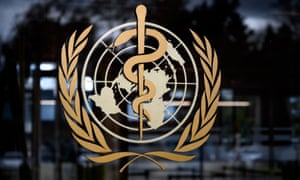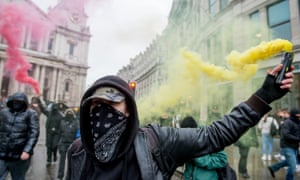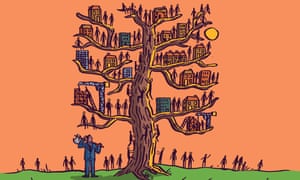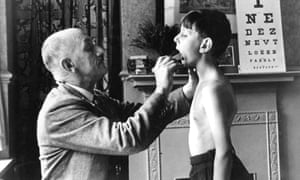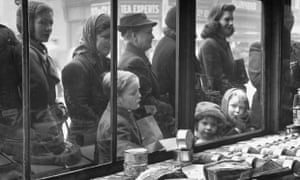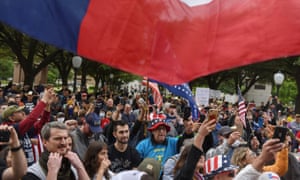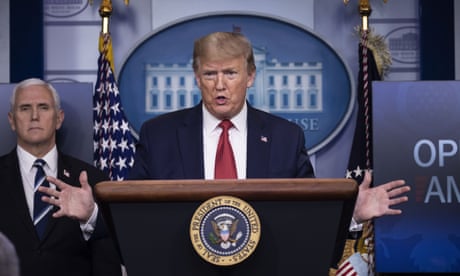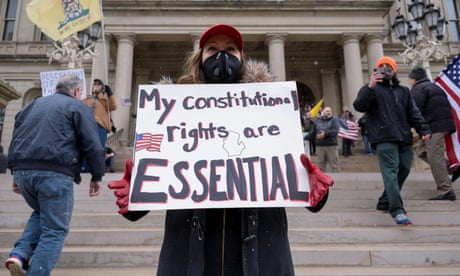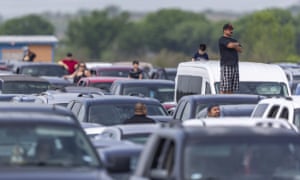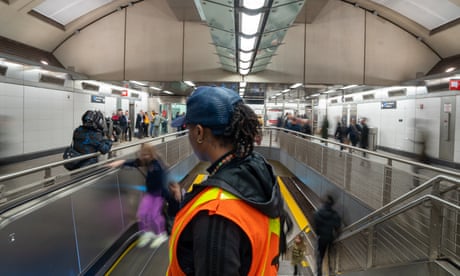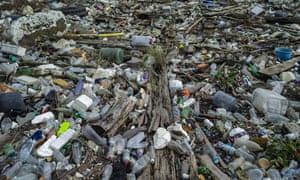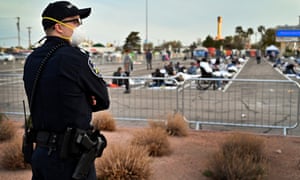As Mr ‘Total Authority’ keeps his focus firmly on re-election, he risks lives far beyond the United States
Simon Tisdall Sun 19 Apr 2020
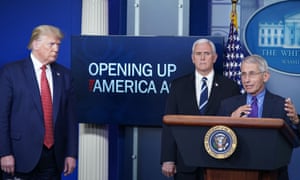
Simon Tisdall Sun 19 Apr 2020

Donald Trump and vice-president Mike Pence listen to Anthony Fauci during the Covid-19 daily briefing on 16 April, in front of sign about easing state lockdowns. Photograph: Mandel Ngan/AFP
Many had wondered what would happen when Donald Trump, failed salesman and gameshow host, faced a real crisis. Now they know. The man who pledged to stop “American carnage” in his inaugural address now owns it. Covid-19 has crowned him lord of misrule.
That’s fitting for a man who last week claimed to exercise “total authority”. Andrew Cuomo, the New York governor who understands what leadership means, reminded him the US does not do kings. But Trump and America’s last monarch, George III, share much in common, tyranny-wise.
Trump is more instinctive dictator than democrat, in the style of his favourite potentate, Saudi Arabia’s Crown Prince Mohammed bin Salman. Just look at his recent threat to shut down Congress, and his enthusiasm for suppressing minority voter turnout.
It’s worth recalling that old King George became mentally ill, since Trumpism is clearly dangerous for your health. It’s beyond reasonable dispute that his coronavirus posturing, preening, prevarication and paranoia fatally hindered the early US response.
“The president’s denial at the beginning was deadly,” Nancy Pelosi, the House Speaker, said last month. “As the president fiddles, people are dying.” She repeated the charge last week, claiming Trump was still causing “unnecessary death and disaster”.
The result, so far, is around 700,000 Covid cases and 35,000 US fatalities. Is it fair to blame him personally for every preventable death? No. But they all occurred on his watch. It’s his job to look out for the American people. He is ultimately responsible.
Trump’s inability to show competent, rational leadership at home and abroad is decimating America’s worldwide reputation
Trump’s primary motive in issuing “guidelines” last week to ease the lockdown was not concern for citizens’ welfare. It was about reviving the economy and getting himself re-elected, come what may. Health experts and state governors forced him to drop rasher measures.
Likewise, Trump endangers the world the US once aspired to lead. The under-resourced, under-pressure World Health Organization has made mistakes during this pandemic. But it retains a vital role in coordinating a global response. Trump unfairly maligned it.
Developing countries, which could be hardest hit in humanitarian and economic terms, need all the help they can get. Trump could not care less. His unjustified suspension of WHO funding threatens lives. Thanks to him, more people may die.
When it comes to scapegoats, however, Trump’s fall-guy of choice is China. Supplanting Iran, Beijing is his latest, indispensable bogeyman. This is truly dangerous. It risks turning an already badly strained relationship into a second cold war.
Trump raised the stakes again last week, alleging that China deliberately under-reported virus deaths. He gave credence to a conspiracy theory, already debunked by the Pentagon, that a biotech weapons lab in Wuhan caused the original outbreak.
Even Trump’s blinkered “base” can surely see what is going on. Their hero messed up big-time, so now he’s trying, as usual, to avoid responsibility by deflecting blame on to others, preferably foreigners and the Chinese communist party – an easy target.
Trump plans to use this crude anti-China narrative to bash Democrat presidential rival, Joe Biden. It has already started. A Trump online ad released this month claims “Biden stands up for China while China cripples America”.
Many had wondered what would happen when Donald Trump, failed salesman and gameshow host, faced a real crisis. Now they know. The man who pledged to stop “American carnage” in his inaugural address now owns it. Covid-19 has crowned him lord of misrule.
That’s fitting for a man who last week claimed to exercise “total authority”. Andrew Cuomo, the New York governor who understands what leadership means, reminded him the US does not do kings. But Trump and America’s last monarch, George III, share much in common, tyranny-wise.
Trump is more instinctive dictator than democrat, in the style of his favourite potentate, Saudi Arabia’s Crown Prince Mohammed bin Salman. Just look at his recent threat to shut down Congress, and his enthusiasm for suppressing minority voter turnout.
It’s worth recalling that old King George became mentally ill, since Trumpism is clearly dangerous for your health. It’s beyond reasonable dispute that his coronavirus posturing, preening, prevarication and paranoia fatally hindered the early US response.
“The president’s denial at the beginning was deadly,” Nancy Pelosi, the House Speaker, said last month. “As the president fiddles, people are dying.” She repeated the charge last week, claiming Trump was still causing “unnecessary death and disaster”.
The result, so far, is around 700,000 Covid cases and 35,000 US fatalities. Is it fair to blame him personally for every preventable death? No. But they all occurred on his watch. It’s his job to look out for the American people. He is ultimately responsible.
Trump’s inability to show competent, rational leadership at home and abroad is decimating America’s worldwide reputation
Trump’s primary motive in issuing “guidelines” last week to ease the lockdown was not concern for citizens’ welfare. It was about reviving the economy and getting himself re-elected, come what may. Health experts and state governors forced him to drop rasher measures.
Likewise, Trump endangers the world the US once aspired to lead. The under-resourced, under-pressure World Health Organization has made mistakes during this pandemic. But it retains a vital role in coordinating a global response. Trump unfairly maligned it.
Developing countries, which could be hardest hit in humanitarian and economic terms, need all the help they can get. Trump could not care less. His unjustified suspension of WHO funding threatens lives. Thanks to him, more people may die.
When it comes to scapegoats, however, Trump’s fall-guy of choice is China. Supplanting Iran, Beijing is his latest, indispensable bogeyman. This is truly dangerous. It risks turning an already badly strained relationship into a second cold war.
Trump raised the stakes again last week, alleging that China deliberately under-reported virus deaths. He gave credence to a conspiracy theory, already debunked by the Pentagon, that a biotech weapons lab in Wuhan caused the original outbreak.
Even Trump’s blinkered “base” can surely see what is going on. Their hero messed up big-time, so now he’s trying, as usual, to avoid responsibility by deflecting blame on to others, preferably foreigners and the Chinese communist party – an easy target.
Trump plans to use this crude anti-China narrative to bash Democrat presidential rival, Joe Biden. It has already started. A Trump online ad released this month claims “Biden stands up for China while China cripples America”.
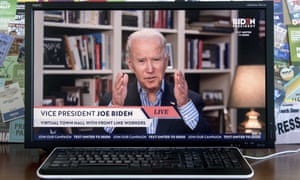
Trump intends to brand Joe Biden as ‘soft’ on China during the presidential election campaign. Photograph: Brian Cahn/Rex
According to analyst Jonathan Swan, writing on Axios: “Trump officials had long been planning to brand Biden as ‘soft’ on China, but the coronavirus pandemic ... has stoked public anger towards Beijing and made the attack more resonant in polling.”
Trump also intends to highlight business dealings with China by Hunter Biden, Joe Biden’s son, in a reprise of his spurious Ukraine impeachment defence. “You’d better believe voters will hear about that,” a Trump campaign operative said.
Trump’s ongoing inability to show competent, rational leadership at home and abroad is decimating America’s worldwide reputation. The WHO decision sparked a fierce backlash from G7 allies and the UN, who pointedly stressed the need for multilateral solidarity.
Meanwhile, Trump’s enduring hostility is bringing out the worst in Beijing. Anger over his Covid-19 smears, coupled with long-running trade disputes, regional tensions, and lecturing about human rights, has goaded China into dropping its non-threatening, diplomatic “peaceful rise” approach. A more aggressive generation of official and semi-official spokespeople has been unleashed by the emperor-president, Xi Jinping. These so-called “wolf warriors” are churning out propaganda and lies of their own, notably a claim that the US army planted the virus in China.
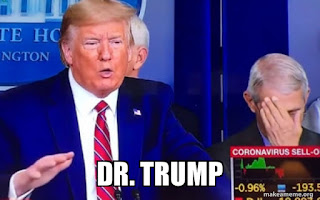
There is much to suggest that China, regardless of Trump, is exploiting the crisis to further its long-term aim of establishing a technological, economic and geopolitical advantage over the west. At home, rising ultra-nationalism and xenophobia are officially tolerated, even encouraged.
China’s top cadres should pause and think again. So, too, should Trump. His reckless blame-games and political machinations are not only killing Americans and American influence overseas. Intensifying mutual antagonism also risks killing any chance that the world’s two biggest powers will cooperate sensibly to eradicate this and future pandemics – for example, by backing a necessary, independent international inquiry into what went wrong. That, in turn, bodes ill for vital bilateral collaboration on the climate crisis and other urgent global challenges such as debt relief.
The world cannot afford another four years of the chaos and carnage personified by Trump. Voting him out in November is the best solution. But what if, fearful of losing amid continuing mayhem, he tries to delay the election?
Experts say he lacks power to do so. But Mr “Total Authority” may disagree. Amid so much avoidable death and destruction, why not kill the constitution and the Founding Fathers, too? As everybody surely realises by now, he’s capable of almost anything.
China’s top cadres should pause and think again. So, too, should Trump. His reckless blame-games and political machinations are not only killing Americans and American influence overseas. Intensifying mutual antagonism also risks killing any chance that the world’s two biggest powers will cooperate sensibly to eradicate this and future pandemics – for example, by backing a necessary, independent international inquiry into what went wrong. That, in turn, bodes ill for vital bilateral collaboration on the climate crisis and other urgent global challenges such as debt relief.
The world cannot afford another four years of the chaos and carnage personified by Trump. Voting him out in November is the best solution. But what if, fearful of losing amid continuing mayhem, he tries to delay the election?
Experts say he lacks power to do so. But Mr “Total Authority” may disagree. Amid so much avoidable death and destruction, why not kill the constitution and the Founding Fathers, too? As everybody surely realises by now, he’s capable of almost anything.
ITS NOT THE FOUNDING FATHERS ITS THE FOUNDING FARMERS, AND THAT'S THE PROBLEM
---30---
